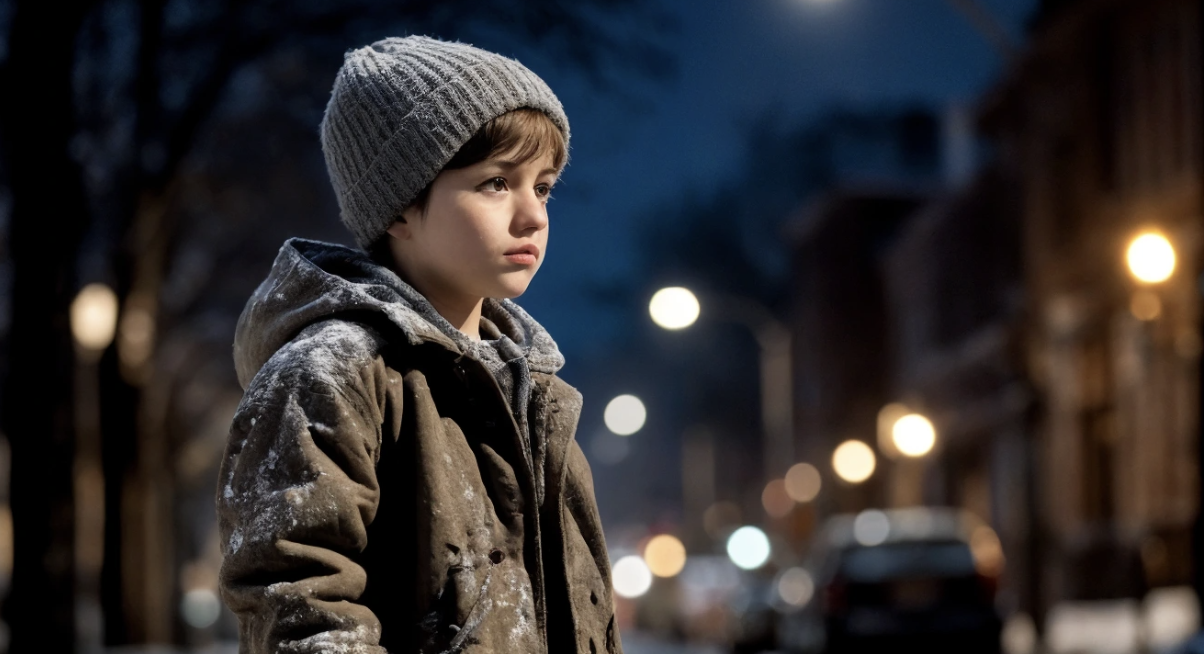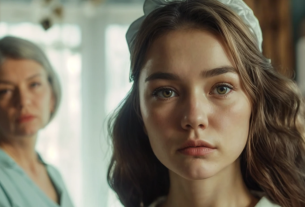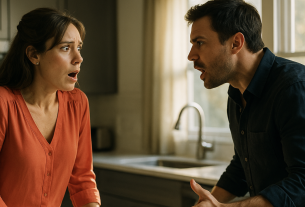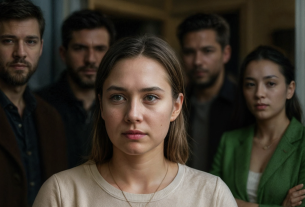Outside the windows of the houses, warm lights of garlands were glowing, Christmas trees were reflected in the glass, and sounds of New Year’s melodies could be heard. And beyond these walls—there reigned a white silence. Snow fell in thick flakes, as if someone invisible was endlessly sprinkling it from the sky. The silence was so dense it seemed almost sacred—like in a temple. No footsteps, no voices. Only the howling of the wind in the pipes and the soft rustle of falling snow, which seemed to cover the city with a blanket of forgotten destinies.
Kolya Sukhanov stood on the porch. He had not yet realized that all this was actually happening. It seemed like a nightmare—a senseless and cruel one. But the cold pierced through his clothes, soaked his socks, and the icy wind cut his face. The backpack lying in the snowdrift reminded him of reality.
“Get out of here! I don’t ever want to see you again!” — a hoarse, hateful voice of his father broke him out of numbness. Immediately after came the slam of the door shutting right in front of his nose.
His father had kicked him out. On Christmas night. Without belongings. Without farewell. Without a chance to return.
And his mother? She stood nearby, pressed against the wall. She folded her arms on her chest. Did not say a word. Did not try to stop her husband. Did not say: “This is our son.” She only helplessly shrugged and bit her lip to keep from crying.
She just stayed silent.
Kolya slowly stepped down from the porch, feeling the snow seep into his slippers, pricking his skin with icy needles. He didn’t know where to go. Inside, it was empty—as if his heart had fallen deep under his ribs.
“That’s it, Kolya. You’re nobody’s. Not even theirs. Especially theirs.”
He did not cry. His eyes were dry, only a sharp pain in his chest reminded him he was alive. It was too late to cry. It was all over. No turning back.
And he walked. Not knowing where. Through the blizzard. Under the light of street lamps that illuminated empty streets. Behind windows, people laughed, drank tea, opened presents. But he was alone. In the middle of a celebration where there was no place for him.
How many hours he wandered—he didn’t remember. The streets blurred into one. A security guard chased him away from an entrance, passersby avoided him when they saw his gaze. He was a stranger. Unwanted. Unnecessary.
This was how his winter began. His first winter of loneliness. The winter of survival.
For the first week, Kolya slept wherever he could—on benches, in underpasses, in bus shelters. Everyone chased him away—shopkeepers, guards, random passersby. In their eyes, he saw not pity but irritation. A boy in a worn-down down jacket, with red eyes and a disheveled appearance—a living reminder of what they themselves feared.
He ate what he could: scraps from garbage bins, once stole a loaf from a stall while the seller was distracted. For the first time in his life, he became a thief. Not out of malice, but out of hunger. Out of fear of dying.
By evening he found shelter—a deserted basement in an old five-story building on the outskirts. It smelled of mold, cat tracks, and something stale. But it was warm—the weak steam rising from a nearby heating main was enough to survive the night. The basement became his home. He spread newspapers, collected cardboard, and covered himself with rags found in the trash.
Sometimes he just sat and cried silently. No tears. Only convulsions in his chest, a clenched pain inside.
One day, an old man with a cane and a long beard found him. He glanced once and said:
“Alive? Well, that’s good. I thought it was the cats turning over bags again.”
The old man left a can of stew and a piece of bread. Just like that. Kolya did not thank him. He just ate greedily with his hands.
After that day, the old man sometimes appeared again. Brought food. Asked no questions. Only once he muttered:
“I was also fourteen when my mother died, and my father hanged himself. Hang in there, boy. People are bastards. But you—you’re not like them.”
Those words stayed with Kolya. He repeated them to himself when he had no strength left.
One morning he could not get up. He felt nauseous, chilled, his whole body shook. A fever burned his temples, his legs gave out. The snow blew him into the basement as if it wanted to freeze him itself. He did not remember how he got out. From what he recalled—he just crawled, clinging to the stairs until someone’s hands picked him up.
“My God, he’s frozen through!” a female voice, strict but full of concern, cut through his consciousness.
That’s how he first saw Anastasia Petrovna—a social worker from the department for minors. Tall, in a dark coat, with tired but attentive eyes. She hugged him like her own, pressed him close—as if she knew he hadn’t felt such warmth for a long time.
“Quiet, son. I’m here. Everything will be fine. Hear me?”
He heard her. Through delirium, through cold shivers. Those words were the first human warmth after many months of loneliness.
Kolya was taken to a shelter on Dvoretskaya Street—a small building with peeling walls but clean sheets and the smell of home-cooked food: potatoes, cabbage soup, quiet hope. He got a bed. A thick blanket. And, most unexpectedly—a sleep without fear. For the first time in many months.
Anastasia Petrovna came every day. Asked how he felt. Brought books. Not childish, not silly fairy tales—but real ones. Chekhov, Kuprin. And then—even a copy of the Constitution.
“Listen, Kolya,” she said, handing him a book. “Knowing your rights means being protected. Even if you have nothing. If you know them—you are no longer helpless.”
He nodded. Read. Absorbed every word like a sponge absorbs water.
Day by day, he grew more confident. Something alive, hot was growing inside. A desire to become someone who knows. Who can protect. Who won’t walk past a child standing barefoot in the snow.
When Kolya turned eighteen, he passed the Unified State Exam and enrolled in the law faculty at Tver State University. It seemed almost impossible—more like a dream than reality. He was afraid he wouldn’t manage. That everything would fall apart. But Anastasia Petrovna just smiled:
“You will manage. You have something inside you that many don’t—a backbone.”
He studied by day and worked at night—mopping floors in a snack bar near the station. Sometimes he slept right in the storeroom between shifts. Drank black tea from a thermos, read everything he could, saved money on food to last until the end of the month. Slept little. Wrote term papers. But never once said, “I can’t.” Never once gave up.
In his second year, he became an assistant at a legal consultation office. He sorted papers, swept floors, ran errands. But he was close. Watched, learned, listened to cases like others listen to music. Like a living textbook.
By the fourth year, he was already writing statements for clients himself. Free of charge. Especially for those who couldn’t afford to pay. Once he was asked to come to a woman in a worn jacket.
“You don’t have money, right?” he asked directly. “Don’t worry. I will help.”
“And who are you?”
“A student for now. But soon I will be someone who can officially protect you.”
She smiled. As if hearing for the first time: “You are not alone.”
When Kolya turned twenty-six, he worked in a large law firm but continued to consult for free those who had nowhere else to turn. Children from orphanages came to him, women after abuse, elderly people cheated out of housing. No one left empty-handed.
He remembered what it was like to be unwanted by anyone. And he didn’t want anyone else to go through that again.
His parents disappeared from his life that Christmas night. He never searched for them again. Didn’t call. Didn’t remember. That night he stopped being their son. And they—his parents.
And now, in winter, when snow was falling again outside the window, two people entered his office. A man with a bent back and a woman in an old headscarf. He recognized them immediately. Something distant froze inside, as if recalling voices from another world.
“Kolya…” — a hoarse, weak voice of his father. “Forgive us… Son.”
His mother gently touched his hand. Her eyes were full of tears. But not those that spilled then. Completely different ones.
Kolya was silent. Watched. There was no pain. No scream inside. Only emptiness.
“You’re late,” he said calmly. “I died for you at that moment. And you—for me too.”
He stood up, walked to the door, held it.
“I wish you health. But there’s no way back.”
They stood a little while, then slowly left. Without hysteria, without excuses. Just left. As if they understood: there was only one chance. And they missed it.
Kolya returned to his desk, opened a new case—about a teenager who ran away from an orphanage. He read, concentrated. No longer trembling. No longer doubting.
Everything that happened to him was not in vain. Every night in the basement. Every stolen piece of bread. Every “go away.”
All of it made him who he became. Someone who can say to another:
“I’m here. You’re not alone.”
And somewhere in his memory still echoed Anastasia Petrovna’s voice:
“Rights are your shield. Even if you have nothing.”
Now he himself became that shield. For those who stand barefoot in the snow.



